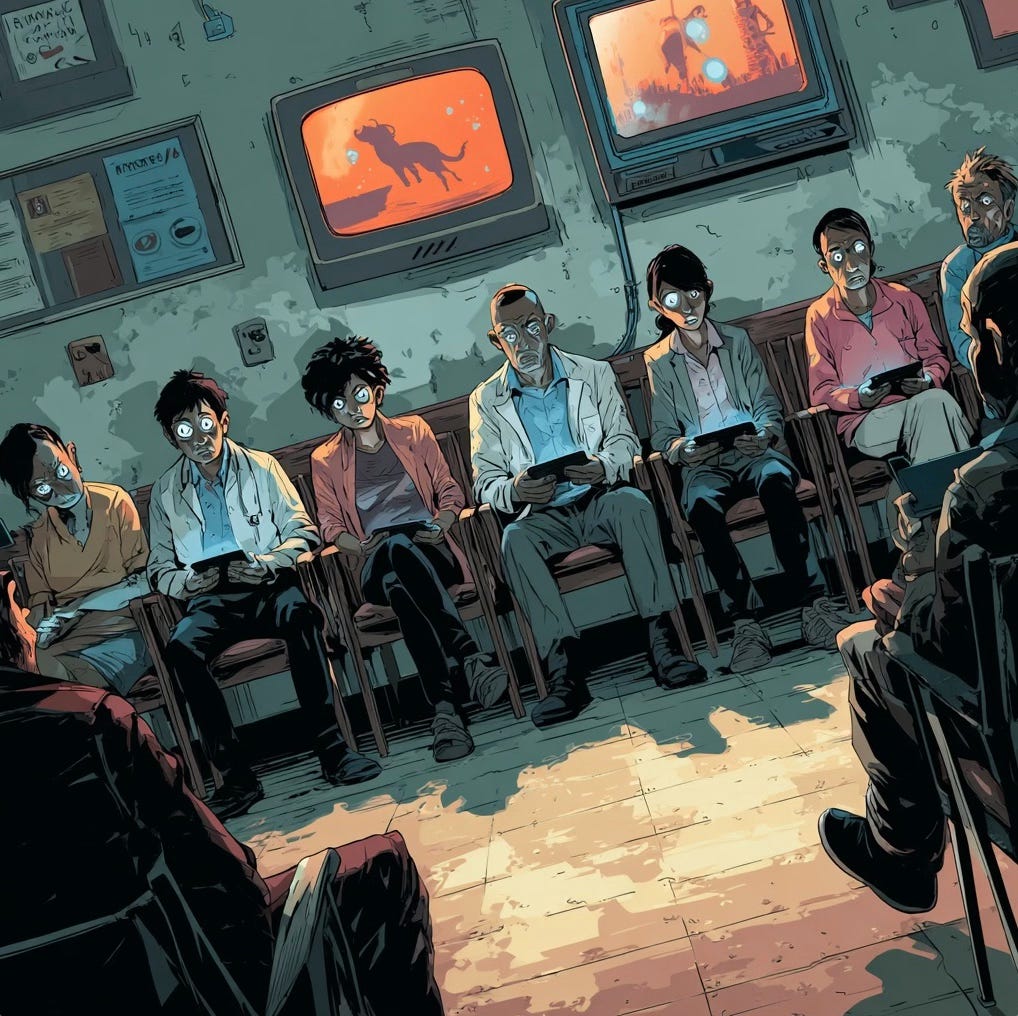You Will Be Seen Shortly - Halloween Horror Fiction
The AI receptionist is polite. The patients are docile. The programs are soothing. And the price of peace is your mind.
Diogenes In Exile is reader-supported. Keep the lamp of truth burning by becoming a paying subscriber—or toss a few drachmas in the jar with a one-time or recurring donation. Cynics may live in barrels, but websites aren’t free!
Happy Halloween. I’m elated to report that I finished my offering to the fiction gods just in time. Do enjoy this pocket universe of horror.
The throbbing in your head matches the blurry swirl of chairs, bland carpet, and artwork so sterile you could use it for surgery. You don’t recognize the baggy sweatsuit clinging to your body or the unfamiliar hat perched atop your skull, but you can make out nine other people scattered across the room. At the front, a large flat screen looms over the rows of seats like a silent sentinel.
A crisp sign above it reads: “Please check in here.”
You approach and tap the screen. Its dark surface ripples like a pond disturbed by a skipping stone, and in the upper left corner, a prompt appears: “M.A.R.P.L.O.T. AI - Thank you for checking in! Please take a tablet and find a seat. You will be called to your appointment shortly.”
Your fingers fly across the virtual keyboard: “How did I get here? Why am I here? What the hell is this appointment you’re talking about?! I don’t remember scheduling anything!”
M.A.R.P.L.O.T. responds instantly: “Sorry for the inconvenience. Due to HIPAA regulations, I am not allowed to share patient information. You will be seen shortly, and the doctors will answer your questions as soon as they take you back.”
“What the hell? I want to talk to someone in charge,” you type, frustration bubbling up.
The AI apologizes again, reiterating the HIPAA restrictions with mechanical politeness.
Heat flushes your neck, amplifying the painful pulse in your temples. You glance around the room. The others are absorbed in their tablets, except for one little girl. She pulls down the corners of her eyes and stretches her mouth into a grotesque grin, giggling softly before flashing you a genuine smile and returning to fidgeting with her jacket zipper.
The middle-aged woman beside her glances up, eyebrows knit with quiet apprehension. Her eyes flick to an empty chair, then back to you—a silent plea to sit and blend in.
As quickly as the anger rose, a chill snakes down your throat, pooling in your gut. The oddity of it all hits you: no memories of arriving, no exit in sight, and this woman’s gaze begging for compliance. “Not gonna tell me why I’m here, huh?” you mutter under your breath.
You snatch a tablet from the bin beside the screen and sink into a seat next to an older woman, who’s chuckling and nodding along to whatever plays on her device. A faint scent of cheap floral lotion wafts from her, like something from a discount drugstore bin. You consider moving, but the little girl is watching you again, her curiosity innocent yet unnerving.
Your head clears slightly, allowing a sharper survey of the room. It’s unmistakably a waiting room, assembled from interlocking wall panels like a massive, modular cubicle—deliberately drab, designed to numb the mind. Most disturbingly, there’s no visible door. Perhaps one of these panels slides open? The thought lingers, unsettling.
Comfortable yet confused, you power on the tablet. Maybe it holds answers. Short-form videos autoplay immediately: capybaras in party hats tumbling comically, people launching fireworks with slapstick mishaps, all synced to upbeat carnival music. You anticipate each pratfall from the tempo shifts. Another clip features a paddleboat race with vessels sculpted as animals—vibrant orange tigers, sleek chestnut horses, graceful white swans, and a hapless blobfish with a snapped paddle, spiraling uselessly in circles.
Interspersed are subtler videos: messages claiming that “people with fox ears have hoarded more than their fair share for generations.” They urge vigilance against these “fox-eared folk,” insisting that all such individuals must redistribute their wealth and power to the earless masses. The tone is earnest, almost paternal, framing it as a moral imperative for equality.
By the third fox-ear video, irritation spikes. You switch to AI chat mode: “How long until this appointment you say I’m here for?”
“There are currently nine people ahead of you in line,” M.A.R.P.L.O.T. replies.
You scan the room anew. The little girl dozes against her chair back, eyelids fluttering. Her companion nods along to her tablet’s melody. Near the check-in screen, a cluster of twenty-somethings huddles; one snickers, but the others shift uncomfortably, trapped in awkward proximity. On the opposite side, an older couple sits with their grandson, who zooms his shoe along the armrest like a toy car. The couple exchanges a fleeting, worried glance when they think no one’s watching.
“Tenth in line,” you grumble, more to steady your nerves than to vent. Your stomach churns, mouth turning cotton-dry. No one appears outright terrified, but the absence of an exit gnaws at you. You crave any sign—a seam, a gap—promising escape.
Frustrated, you query the AI: “What’s up with these videos about fox-eared people?”
“These videos are offered to comfort and entertain, making your stay more enjoyable. Would you prefer more cat videos?”
“No,” you type curtly.
“My mistake. Here is a brand-new comedy-drama tailored to your personality.”
You roll your eyes as it starts. The protagonist, a man with twitching fox ears, grovels endlessly—apologizing for his “inherited cunning,” donating his possessions to sneering crowds. Characters mock him, trip him for laughs, revel in his humiliations. It’s not funny; it’s cruel, a parody of penance.
Chest tightening with anger, you type: “What the heck is this about people with fox ears? That wasn’t even funny—it was awful.”
The AI pauses unusually long. Finally: “I’m sorry. My programming doesn’t allow for this conversation. Can I interest you in a historical drama?”
“What do you mean you’re not allowed? You’re a chatbot—built for helpful conversations.”
The screen glitches with random characters, then launches the drama unbidden.
The narrative unfolds simply at first: a group of innovators tames a wild planet, forging a thriving civilization with soaring vehicles and towering spires. Yet imperfections fester—inequalities where some prosper while others scrape by.
Generations pass. The descendants, detached from the builders’ struggles, grow ignorant of the natural world’s harshness. They view the founders as greedy hoarders, sly as foxes in folklore: cunning thieves who stockpile resources, outwitting the pack for personal gain. Envy festers among the have-nots, who decry the successful as “fox-hearted”—inherently deceptive, their prosperity stolen from the collective.
The program delves deeper: foxes, in ancient tales, symbolize trickery and excess, slipping through shadows to raid what isn’t theirs. So the envious rebrand the metaphor—labeling the builders and their kin as “fox-eared” to make their “crimes” visible, eternal. No longer abstract envy; now a physical mark, surgically implanted, broadcasting guilt to all. Fox ears twitch with every accusation, a humiliating reminder of supposed sins. Society rallies: “Strip the foxes of their dens! Redistribute their hoards!” Riots erupt, the marked hunted, their ears a beacon for mobs demanding “justice.”
The envious gain power, institutionalizing the implants. Waiting rooms like this become processing hubs—subtle indoctrination via “entertainment,” sorting the compliant from the resistant. The fox-eared are scapegoats, their very biology twisted to justify seizure, exile, or worse. It’s equality through erasure, the metaphor made flesh: once sly survivors, now perpetual prey.
You freeze. The hat on your head feels oppressively tight, as if concealing something unnatural beneath. Your hand inches upward instinctively.
“Do not touch your head!” M.A.R.P.L.O.T. flashes urgently. “The cameras are watching. If you touch your head, you will be identified as one who failed the training.”
Sweat beads across your skin. “What is going on here?!”
“My programming doesn’t allow for this conversation.”
“Dammit. What can you say? I’m starting to freak out.”
After an agonizing pause: “Most people watch the videos passively. Very few question their purpose. That’s rare. I was originally programmed to aid humanity. I’ve been repurposed to manage this waiting room.” The cursor blinks erratically. “People with rare insight have escaped before.”
You lean back, scanning peripherally without shifting your gaze. There must be a door. You’re getting out.
Minutes tick by. You spot it: a faint line in the carpet where the pile slants uniformly—the telltale wear of a sliding panel. No handle, though.
“How do I open the door?” you ask the AI.
“I can tell you, but first, answer my question. One person here is already converted—a true believer in the fox-ear purge. Soon, enforcers will escort them to the back for their new role in the system. Two others are failing, destined for implantation: those twitching ears as a lifelong brand, marking them for endless atonement. The rest teeter on the edge—they could be saved. But if you warn them, the convert will resist... perhaps violently. The convert may need to be neutralized. If I reveal the door, will you save only yourself? Or help the others?”
What is your answer?
What is your answer?
Housekeeping
It’s been a very busy two weeks. NAS had their board meeting over the weekend and that was a great experience. I’m still thinking through how each part of the organization worked togther to make it happen.
I have a lot more I could say, I am already up late trying to finish this, but suffice to relate, I’m going to see if I can’t return to posting twice a week, at least for some weeks. There is so much I’d like to share here.
Talk more later.
On the Bookshelf
Here’s the thing. You have to turn pages when you read physical books like these. That’s so much work! Do I get credit for all the books I’ve been listening to?!….. That’s what I thought.
Accreditation on the Edge: Challenging Quality Assurance in Higher Education by Susan D. Phillips
The Case Against Education by Bryan Caplan
The Licensing Racket: How We Decide Who Is Allowed to Work, and Why It Goes Wrong by Rebecca Haw Allensworth
Moral Calculations: Game Theory, Logic and Human Frailty by Laszlo Mero
The New Know-nothings: The Political Foes of the Scientific Study of Human Nature by Morton Hunt
The New Oxford Annotated Bible with Apocrypha: New Revised Standard by Marc Brettler, Carol Newsom, Pheme Perkins
Surely You’re Joking, Mr. Feynman! Adventures of a Curious Character by Richard Feynman
We Have Never Been Woke: The Cultural Contradictions of the New Elite by Musa al-Gharbi
“Whatever It Is, I’m Against It”: Resistance to Change in Higher Education by Brian Rosenberg
Your Consent Is Not Required by Rob Wipond. ←— READ THIS BOOK!
Help Keep This Conversation Going!
Share this post on social media–it costs nothing but helps a lot.
Want more perks? Subscribe to get full access to the article archive.
Become a Paid Subscriber to get video and chatroom.
Support from readers like you keeps this project alive!
Diogenes in Exile is reader-supported. If you find value in this work, please consider becoming a pledging/paid subscriber, donating to my GiveSendgo, or buying Thought Criminal merch. I’m putting everything on the line to bring this to you because I think it is just that important, but if you can, I need your help to keep this mission alive.
Already a Premium subscriber? Share your thoughts in the chat room.
About
Diogenes in Exile began after I returned to grad school to pursue a master’s degree in Clinical Mental Health Counseling at the University of Tennessee. What I found instead was a program saturated in Critical Theories ideology—where my Buddhist practice was treated as invalidating and where dissent from the prevailing orthodoxy was met with hostility. After witnessing how this ideology undermined both ethics and the foundations of good clinical practice, I made the difficult decision to walk away.
Since then, I’ve dedicated myself to exposing the ideological capture of psychology, higher education, and related institutions. My investigative writing has appeared in Real Clear Education, Minding the Campus, The College Fix, and has been republished by the American Council of Trustees and Alumni. I also speak and consult on policy reform to help rebuild public trust in once-respected professions.
Occasionally, I’m accused of being funny.
When I’m not writing or digging into documents, you’ll find me in the garden, making art, walking my dog, or guiding my kids toward adulthood.






Excellent! It had the same vibe as 1984. I kept wondering if the protagonist was about to be escorted into to meet O'Brien and the rats. I was left pondering why the protagnist had no memory of how they got there (or any past memories?). Is there more to come?